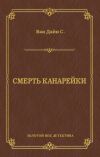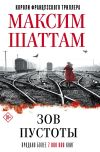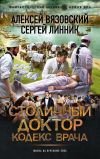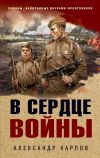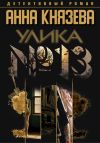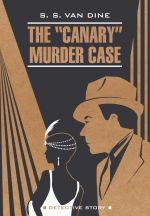
Автор книги: Стивен Ван Дайн
Жанр: Иностранные языки, Наука и Образование
Возрастные ограничения: +16
сообщить о неприемлемом содержимом
Текущая страница: 5 (всего у книги 17 страниц) [доступный отрывок для чтения: 5 страниц]
Chapter VIII. The Invisible Murderer
(Tuesday, September 11; 11.45 a.m.)
Markham went to the window and stood, his hands behind him, looking down into the little paved rear yard. After several minutes he turned slowly.
“The situation, as I see it,” he said, “boils down to this:—The Odell girl has an engagement for dinner and the theatre with a man of some distinction. He calls for her a little after seven, and they go out together. At eleven o’clock they return. He goes with her into her apartment and remains half an hour. He leaves at half past eleven and asks the phone operator to call him a taxi. While he is waiting the girl screams and calls for help, and, in response to his inquiries, she tells him nothing is wrong and bids him go away. The taxi arrives, and he departs in it. Ten minutes later some one telephones her, and a man answers from her apartment. This morning she is found murdered, and the apartment ransacked.”
He took a long draw on his cigar.
“Now, it is obvious that when she and her escort returned last night, there was another man in this place somewhere; and it is also obvious that the girl was alive after her escort had departed. Therefore, we must conclude that the man who was already in the apartment was the person who murdered her. This conclusion is further corroborated by Doctor Doremus’s report that the crime occurred between eleven and twelve. But since her escort did not leave till half past eleven, and spoke with her after that time, we can put the actual hour of the murder as between half past eleven and midnight. … These are the inferable facts from the evidence thus far adduced.”
“There’s not much getting away from ’em,” agreed Heath.
“At any rate, they’re interestin’,” murmured Vance.
Markham, walking up and down earnestly, continued:
“The features of the situation revolving round these inferable facts are as follows:—There was no one hiding in the apartment at seven o’clock—the hour the maid went home. Therefore, the murderer entered the apartment later. First, then, let us consider the side door. At six o’clock—an hour before the maid’s departure—the janitor bolted it on the inside, and both operators disavow emphatically that they went near it. Moreover, you, Sergeant, found it bolted this morning. Hence, we may assume that the door was bolted on the inside all night, and that nobody could have entered that way. Consequently, we are driven to the inevitable alternative that the murderer entered by the front door. Now, let us consider this other means of entry. The phone operator who was on duty until ten o’clock last night asserts positively that the only person who entered the front door and passed down the main hall to this apartment was a man who rang the bell and, getting no answer, immediately walked out again. The other operator, who was on duty from ten o’clock until this morning, asserts with equal positiveness that no one entered the front door and passed the switchboard coming to this apartment. Add to all this the fact that every window on this floor is barred, and that no one from up-stairs can descend into the main hall without coming face to face with the operator, and we are, for the moment, confronted with an impasse.”
Heath scratched his head, and laughed mirthlessly.
“It don’t make sense, does it, sir?”
“What about the next apartment?” asked Vance, “the one with the door facing the rear passageway—No. 2, I think?”
Heath turned to him patronizingly. “I looked into that the first thing this morning. Apartment No. 2 is occupied by a single woman; and I woke her up at eight o’clock and searched the place. Nothing there. Anyway, you have to walk past the switchboard to reach her apartment the same as you do to reach this one; and nobody called on her or left her apartment last night. What’s more, Jessup, who’s a shrewd sound lad, told me this woman is a quiet, ladylike sort, and that she and Odell didn’t even know each other.”
“You’re so thorough, Sergeant!” murmured Vance.
“Of course,” put in Markham, “it would have been possible for some one from the other apartment to have slipped in here behind the operator’s back between seven and eleven, and then to have slipped back after the murder. But as Sergeant Heath’s search this morning failed to uncover any one, we can eliminate the possibility of our man having operated from that quarter.”
“I dare say you’re right,” Vance indifferently admitted. “But it strikes me, Markham old dear, that your own affectin’ recapitulation of the situation jolly well eliminates the possibility of your man’s having operated from any quarter. … And yet he came in, garroted the unfortunate damsel, and departed—eh, what? … It’s a charmin’ little problem. I wouldn’t have missed it for worlds.”
“It’s uncanny,” pronounced Markham gloomily.
“It’s positively spiritualistic,” amended Vance. “It has the caressin’ odor of a séance. Really, y’ know, I’m beginning to suspect that some medium was hovering in the vicinage last night doing some rather tip-top materializations. … I say, Markham, could you get an indictment against an ectoplasmic emanation?”
“It wasn’t no spook that made those finger-prints,” growled Heath, with surly truculence.
Markham halted his nervous pacing and regarded Vance irritably.
“Damn it! This is rank nonsense. The man got in some way, and he got out, too. There’s something wrong somewhere. Either the maid is mistaken about some one being here when she left, or else one of those phone operators went to sleep and won’t admit it.”
“Or else one of ’em’s lying,” supplemented Heath.
Vance shook his head. “The dusky fille de chambre[39]39
fille de chambre (фр.) – горничная в отеле
[Закрыть], I’d say, is eminently trustworthy. And if there was any doubt about any one’s having come in the front door unnoticed, the lads on the switchboard would, in the present circumstances, be only too eager to admit it. … No, Markham, you’ll simply have to approach this affair from the astral plane, so to speak.”
Markham grunted his distaste of Vance’s jocularity.
“That line of investigation I leave to you with your metaphysical theories and esoteric hypotheses.”
“But, consider,” protested Vance banteringly. “You’ve proved conclusively—or, rather, you’ve demonstrated legally—that no one could have entered or departed from this apartment last night; and, as you’ve often told me, a court of law must decide all matters, not in accord with the known or suspected facts, but according to the evidence; and the evidence in this case would prove a sound alibi for every corporeal being extant. And yet, it’s not exactly tenable, d’ ye see, that the lady strangled herself. If only it had been poison, what an exquisite and satisfying suicide case you’d have! … Most inconsiderate of her homicidal visitor not to have used arsenic instead of his hands!”
“Well, he strangled her,” pronounced Heath. “Furthermore, I’ll lay my money on the fellow who called here last night at half past nine and couldn’t get in. He’s the bird I want to talk to.”
“Indeed?” Vance produced another cigarette. “I shouldn’t say, to judge from our description of him, that his conversation would prove particularly fascinatin’.”
An ugly light came into Heath’s eyes.
“We’ve got ways,” he said through his teeth, “of getting damn interesting conversation outa people who haven’t no great reputation for repartee.”
Vance sighed. “How the Four Hundred needs you, my Sergeant!”
Markham looked at his watch.
“I’ve got pressing work at the office,” he said, “and all this talk isn’t getting us anywhere.” He put his hand on Heath’s shoulder. “I leave you to go ahead. This afternoon I’ll have these people brought down to my office for another questioning—maybe I can jog their memories a bit. … You’ve got some line of investigation planned?”
“The usual routine,” replied Heath drearily. “I’ll go through Odell’s papers, and I’ll have three or four of my men check up on her.”
“You’d better get after the Yellow Taxicab Company right away,” Markham suggested. “Find out, if you can, who the man was who left here at half past eleven last night, and where he went.”
“Do you imagine for one moment,” asked Vance, “that if this man knew anything about the murder, he would have stopped in the hall and asked the operator to call a taxi for him?”
“Oh, I don’t look for much in that direction.” Markham’s tone was almost listless. “But the girl may have said something to him that’ll give us a lead.”
Vance shook his head facetiously. “O welcome pure-ey’d Faith, white-handed Hope, thou hovering angel, girt with golden wings!”
Markham was in no mood for chaffing. He turned to Heath, and spoke with forced cheeriness.
“Call me up later this afternoon. I may get some new evidence out of the outfit we’ve just interviewed. … And,” he added, “be sure to put a man on guard here. I want this apartment kept just as it is until we see a little more light.”
“I’ll attend to that,” Heath assured him.
Markham and Vance and I went out and entered the car. A few minutes later we were winding rapidly across town through Central Park.
“Recall our recent conversazione[40]40
conversazione (итал.) — беседа, разговор
[Закрыть] about footprints in the snow?” asked Vance, as we emerged into Fifth Avenue and headed south.
Markham nodded abstractedly.
“As I remember,” mused Vance, “in the hypothetical case you presented there were not only footprints but a dozen or more witnesses—including a youthful prodigy—who saw a figure of some kind cross the hibernal landscape. … Grau, teurer Freund, ist alle Theorie![41]41
Grau, teurer Freund, ist alle Theorie! (нем.) – Теория сера, мой друг! (цитата из трагедии Гете «Фауст», часть I, сцена IV.)
[Закрыть] Here you are in a most beastly pother because of the disheartenin’ fact that there are neither footprints in the snow nor witnesses who saw a fleeing figure. In short, you are bereft of both direct and circumstantial evidence. … Sad, sad.”
He wagged his head dolefully.
“Y’ know, Markham, it appears to me that the testimony in this case constitutes conclusive legal proof that no one could have been with the deceased at the hour of her passing, and that, ergo[42]42
ergo (лат.) – следовательно
[Закрыть], she is presumably alive. The strangled body of the lady is, I take it, simply an irrelevant circumstance from the standpoint of legal procedure. I know that you learned lawyers won’t admit a murder without a body; but how, in sweet Heaven’s name, do you get around a corpus delicti[43]43
corpus delicti (лат.) – вещественное доказательство
[Закрыть] without a murder?”
“You’re talking nonsense,” Markham rebuked him, with a show of anger.
“Oh, quite,” agreed Vance. “And yet, it’s a distressin’ thing for a lawyer not to have footprints of some kind, isn’t it, old dear? It leaves one so up in the air.”
Suddenly Markham swung round. “You, of course, don’t need footprints, or any other kind of material clues,” he flung at Vance tauntingly. “You have powers of divination such as are denied ordinary mortals. If I remember correctly, you informed me, somewhat grandiloquently, that, knowing the nature and conditions of a crime, you could lead me infallibly to the culprit, whether he left footprints or not. You recall that boast? … Well, here’s a crime, and the perpetrator left no footprints coming or going. Be so good as to end my suspense by confiding in me who killed the Odell girl.”
Vance’s serenity was not ruffled by Markham’s ill-humored challenge. He sat smoking lazily for several minutes; then he leaned over and flicked his cigarette ash out of the window.
“’Pon my word, Markham,” he rejoined evenly, “I’m half inclined to look into this silly murder. I think I’ll wait, though, and see whom the nonplussed Heath turns up with his inquiries.”
Markham grunted scoffingly, and sank back on the cushions.
“Your generosity wrings me,” he said.
Chapter IX. The Pack in Full Cry
(Tuesday, September 11; afternoon)
On our way down-town that morning we were delayed for a considerable time in the traffic congestion just north of Madison Square, and Markham anxiously looked at his watch.
“It’s past noon,” he said. “I think I’ll stop at the club and have a bite of lunch. … I presume that eating at this early hour would be too plebeian for so exquisite a hothouse flower as you.”
Vance considered the invitation.
“Since you deprived me of my breakfast,” he decided, “I’ll permit you to buy me some eggs Bénédictine.[44]44
eggs Bénédictine – яйца Бенедикт, блюдо на завтрак, представляющее собой бутерброд из двух половинок булочки с яйцами пашот, ветчиной и голландским соусом
[Закрыть]”
A few minutes later we entered the almost empty grill of the Stuyvesant Club, and took a table near one of the windows looking southward over the treetops of Madison Square.
Shortly after we had given our order a uniformed attendant entered and, bowing deferentially at the District Attorney’s elbow, held out an unaddressed communication sealed in one of the club’s envelopes. Markham read it with an expression of growing curiosity, and as he studied the signature a look of mild surprise came into his eyes. At length he looked up and nodded to the waiting attendant. Then, excusing himself, he left us abruptly. It was fully twenty minutes before he returned.
“Funny thing,” he said. “That note was from the man who took the Odell woman to dinner and the theatre last night. … A small world,” he mused. “He’s staying here at the club—he’s a non-resident member and makes it his headquarters when he’s in town.”
“You know him?” Vance put the question disinterestedly.
“I’ve met him several times—chap named Spotswoode.” Markham seemed perplexed. “He’s a man of family, lives in a country house on Long Island, and is regarded generally as a highly respectable member of society—one of the last persons I’d suspect of being mixed up with the Odell girl. But, according to his own confession, he played around a good deal with her during his visits to New York—‘sowing a few belated wild oats,’ as he expressed it—and last night took her to Francelle’s for dinner and to the Winter Garden afterwards.”
“Not my idea of an intellectual, or even edifyin’, evening,” commented Vance. “And he selected a deuced unlucky day for it. … I say, imagine opening the morning paper and learning that your petite dame[45]45
petite dame (фр.) – дамочка
[Закрыть] of the preceding evening had been strangled! Disconcertin’, what?”
“He’s certainly disconcerted,” said Markham. “The early afternoon papers were out about an hour ago, and he’d been phoning my office every ten minutes, when I suddenly walked in here. He’s afraid his connection with the girl will leak out and disgrace him.”
“And won’t it?”
“I hardly see the necessity. No one knows who her escort was last evening; and since he obviously had nothing to do with the crime, what’s to be gained by dragging him into it? He told me the whole story, and offered to stay in the city as long as I wanted him to.”
“I infer, from the cloud of disappointment that enveloped you when you returned just now, that his story held nothing hopeful for you in the way of clues.”
“No,” Markham admitted. “The girl apparently never spoke to him of her intimate affairs; and he couldn’t give me a single helpful suggestion. His account of what happened last night agreed perfectly with Jessup’s. He called for the girl at seven, brought her home at about eleven, stayed with her half an hour or so, and then left her. When he heard her call for help he was frightened, but on being assured by her there was nothing wrong, he concluded she had dozed off into a nightmare, and thought no more of it. He drove direct to the club here, arriving about ten minutes to twelve. Judge Redfern, who saw him descend from the taxi, insisted on his coming up-stairs and playing poker with some men who were waiting in the Judge’s rooms for him. They played until three o’clock this morning.”
“Your Long Island Don Juan has certainly not supplied you with any footprints in the snow.”
“Anyway, his coming forward at this time closes one line of inquiry over which we might have wasted considerable time.”
“If many more lines of inquiry are closed,” remarked Vance dryly, “you’ll be in a distressin’ dilemma, don’t y’ know.”
“There are enough still open to keep me busy,” said Markham, pushing back his plate and calling for the check. He rose; then pausing, regarded Vance meditatingly. “Are you sufficiently interested to want to come along?”
“Eh, what? My word! … Charmed, I’m sure. But, I say, sit down just a moment—there’s a good fellow!—till I finish my coffee.”
I was considerably astonished at Vance’s ready acceptance, careless and bantering though it was, for there was an exhibition of old Chinese prints at the Montross Galleries that afternoon, which he had planned to attend. A Riokai and a Moyeki, said to be very fine examples of Sung painting, were to be shown; and Vance was particularly eager to acquire them for his collection.
We rode with Markham to the Criminal Courts building and, entering by the Franklin Street door, took the private elevator to the District Attorney’s spacious but dingy private office which overlooked the gray-stone ramparts of the Tombs. Vance seated himself in one of the heavy leather-upholstered chairs near the carved oak table on the right of the desk, and lighted a cigarette with an air of cynical amusement.
“I await with anticipat’ry delight the grinding of the wheels of justice,” he confided, leaning back lazily.
“You are doomed not to hear the first turn of those wheels,” retorted Markham. “The initial revolution will take place outside of this office.” And he disappeared through a swinging door which led to the judges’ chambers.
Five minutes later he returned, and sat down in the high-backed swivel chair at his desk, with his back to the four tall narrow windows in the south wall of the office.
“I just saw Judge Redfern,” he explained—“it happened to be the midday recess—and he verified Spotswoode’s statement in regard to the poker game. The Judge met him outside of the club at ten minutes before midnight, and was with him until three in the morning. He noted the time because he had promised his guests to be back at half past eleven, and was twenty minutes late.”
“Why all this substantiation of an obviously unimportant fact?” asked Vance.
“A matter of routine,” Markham told him, slightly impatient. “In a case of this kind every factor, however seemingly remote to the main issue, must be checked.”
“Really, y’ know, Markham”—Vance laid his head back on the chair and gazed dreamily at the ceiling—“one would think that this eternal routine, which you lawyer chaps worship so devoutly, actually got one somewhere occasionally; whereas it never gets one anywhere. Remember the Red Queen in ‘Through the Looking-Glass—’”
“I’m too busy at present to debate the question of routine versus[46]46
versus (лат.) – против
[Закрыть] inspiration,” Markham answered brusquely, pressing a button beneath the edge of his desk.
Swacker, his youthful and energetic secretary, appeared at the door which communicated with a narrow inner chamber between the District Attorney’s office and the main waiting-room.
“Yes, Chief?” The secretary’s eyes gleamed expectantly behind his enormous horn-rimmed glasses.
“Tell Ben to send me in a man at once.”[47]47
“Ben” was Colonel Benjamin Hanlon, the commanding officer of the Detective Division attached to the District Attorney’s office.
[Закрыть]
Swacker went out through the corridor door, and a minute or two later a suave, rotund man, dressed immaculately and wearing a pince-nez[48]48
pince-nez (фр.) — пенсне, очки без заушных дужек
[Закрыть], entered, and stood before Markham with an ingratiating smile.
“Morning, Tracy.” Markham’s tone was pleasant but curt. “Here’s a list of four witnesses in connection with the Odell case that I want brought down here at once—the two phone operators, the maid, and the janitor. You’ll find them at 184 West 71st Street: Sergeant Heath is holding them there.”
“Right, sir.” Tracy took the memorandum, and with a priggish, but by no means inelegant, bow went out.
During the next hour Markham plunged into the general work that had accumulated during the forenoon, and I was amazed at the man’s tremendous vitality and efficiency. He disposed of as many important matters as would have occupied the ordinary business man for an entire day. Swacker bobbed in and out with electric energy, and various clerks appeared at the touch of a buzzer, took their orders, and were gone with breathless rapidity. Vance, who had sought diversion in a tome of famous arson trials, looked up admiringly from time to time, and shook his head in mild reproach at such spirited activity.
It was just half past two when Swacker announced the return of Tracy with the four witnesses; and for two hours Markham questioned and cross-questioned them with a thoroughness and an insight that even I, as a lawyer, had rarely seen equalled. His interrogation of the two phone operators was quite different from his casual questioning of them earlier in the day; and if there had been a single relevant omission in their former testimony, it would certainly have been caught now by Markham’s gruelling catechism. But when, at last, they were told they could go, no new information had been brought to light. Their stories now stood firmly grounded: no one—with the exception of the girl herself and her escort, and the disappointed visitor at half past nine—had entered the front door and passed down the hall to the Odell apartment from seven o’clock on; and no one had passed out that way. The janitor reiterated stubbornly that he had bolted the side door a little after six, and no amount of wheedling or aggression could shake his dogged certainty on that point. Amy Gibson, the maid, could add nothing to her former testimony. Markham’s intensive examination of her produced only repetitions of what she had already told him.
Not one new possibility—not one new suggestion—was brought out. In fact, the two hours’ interlocutory proceedings resulted only in closing up every loophole in a seemingly incredible situation. When, at half past four, Markham sat back in his chair with a weary sigh, the chance of unearthing a promising means of approach to the astonishing problem seemed more remote than ever.
Vance closed his treatise on arson, and threw away his cigarette.
“I tell you, Markham old chap,” he grinned, “this case requires umbilicular contemplation, not routine. Why not call in an Egyptian seeress with a flair[49]49
flair (фр.) – нюх, чутье
[Закрыть] for crystal-gazing?”
“If this sort of thing goes on much longer,” returned Markham dispiritedly, “I’ll be tempted to take your advice.”
Just then Swacker looked in through the door to say that Inspector Brenner was on the wire. Markham picked up the telephone receiver, and as he listened he jotted down some notes on a pad. When the call had ended, he turned to Vance.
“You seemed disturbed over the condition of the steel jewel-case we found in the bedroom. Well, the expert on burglar tools just called up; and he verifies his opinion of this morning. The case was pried open with a specially made cold chisel such as only a professional burglar would carry or would know how to use. It had an inch-and-three-eighths bevelled bit and a one-inch flat handle. It was an old instrument—there was a peculiar nick in the blade—and is the same one that was used in a successful house-break on upper Park Avenue early last summer. … Does that highly exciting information ameliorate your anxiety?”
“Can’t say that it does.” Vance had again become serious and perplexed. “In fact, it makes the situation still more fantastic. … I could see a glimmer of light—eerie and unearthly, perhaps, but still a perceptible illumination—in all this murkiness if it wasn’t for that jewel-case and the steel chisel.”
Markham was about to answer when Swacker again looked in and informed him that Sergeant Heath had arrived and wanted to see him.
Heath’s manner was far less depressed than when we had taken leave of him that morning. He accepted the cigar Markham offered him, and seating himself at the conference table in front of the District Attorney’s desk, drew out a battered note-book.
“We’ve had a little good luck,” he began. “Burke and Emery—two of the men I put on the case—got a line on Odell at the first place they made inquiries. From what they learned, she didn’t run around with many men—limited herself to a few live wires, and played the game with what you’d call finesse[50]50
finesse (фр.) – утонченность, изящество
[Закрыть]. … The principal one—the man who’s been seen most with her—is Charles Cleaver.”
Markham sat up.
“I know Cleaver—if it’s the same one.”
“It’s him, all right,” declared Heath. “Former Brooklyn Tax Commissioner; been interested in a pool-room for pony-betting over in Jersey City ever since. Hangs out at the Stuyvesant Club, where he can hobnob with his old Tammany Hall cronies.”
“That’s the one,” nodded Markham. “He’s a kind of professional gay-dog—known as Pop, I believe.”
Vance gazed into space.
“Well, well,” he murmured. “So old Pop Cleaver was also entangled with our subtle and sanguine Dolores. She certainly couldn’t have loved him for his beaux yeux[51]51
beaux yeux (фр.) – красивые глаза
[Закрыть].”
“I thought, sir,” went on Heath, “that, seeing as how Cleaver is always in and out of the Stuyvesant Club, you might ask him some questions about Odell. He ought to know something.”
“Glad to, Sergeant.” Markham made a note on his pad. “I’ll try to get in touch with him to-night. … Any one else on your list?”
“There’s a fellow named Mannix—Louis Mannix—who met Odell when she was in the ‘Follies’; but she chucked him over a year ago, and they haven’t been seen together since. He’s got another girl now. He’s the head of the firm of Mannix and Levine, fur importers, and is one of your night-club rounders—a heavy spender. But I don’t see much use of barking up that tree—his affair with Odell went cold too long ago.”
“Yes,” agreed Markham; “I think we can eliminate him.”
“I say, if you keep up this elimination much longer,” observed Vance, “you won’t have anything left but the lady’s corpse.”
“And then, there’s the man who took her out last night,” pursued Heath. “Nobody seems to know his name—he must’ve been one of those discreet, careful old boys. I thought at first he might have been Cleaver, but the descriptions don’t tally. … And by the way, sir, here’s a funny thing: when he left Odell last night he took the taxi down to the Stuyvesant Club, and got out there.”
Markham nodded. “I know all about that, Sergeant. And I know who the man was; and it wasn’t Cleaver.”
Vance was chuckling.
“The Stuyvesant Club seems to be well in the forefront of this case,” he said. “I do hope it doesn’t suffer the sad fate of the Knickerbocker Athletic.”[52]52
Vance was here referring to the famous Molineux case, which, in 1898, sounded the death-knell of the old Knickerbocker Athletic Club at Madison Avenue and 45th Street. But it was commercialism that ended the Stuyvesant’s career. This club, which stood on the north side of Madison Square, was razed a few years later to make room for a skyscraper.
[Закрыть]
Heath was intent on the main issue.
“Who was the man, Mr. Markham?”
Markham hesitated, as if pondering the advisability of taking the other into his confidence. Then he said: “I’ll tell you his name, but in strict confidence. The man was Kenneth Spotswoode.”
He then recounted the story of his being called away from lunch, and of his failure to elicit any helpful suggestions from Spotswoode. He also informed Heath of his verification of the man’s statements regarding his movements after meeting Judge Redfern at the club.
“And,” added Markham, “since he obviously left the girl before she was murdered, there’s no necessity to bother him. In fact, I gave him my word I’d keep him out of it for his family’s sake.”
“If you’re satisfied, sir, I am.” Heath closed his note-book and put it away. “There’s just one other little thing. Odell used to live on 110th Street, and Emery dug up her former landlady and learned that this fancy guy the maid told us about used to call on her regularly.”
“That reminds me, Sergeant.” Markham picked up the memorandum he had made during Inspector Brenner’s phone call. “Here’s some data the Professor gave me about the forcing of the jewel-case.”
Heath studied the paper with considerable eagerness. “Just as I thought!” He nodded his head with satisfaction. “Clear-cut professional job, by somebody who’s been in the line of work before.”
Vance roused himself.
“Still, if such is the case,” he said, “why did this experienced burglar first use the insufficient poker? And why did he overlook the living-room clothes-press?”
“I’ll find all that out, Mr. Vance, when I get my hands on him,” asserted Heath, with a hard look in his eyes. “And the guy I want to have a nice quiet little chat with is the one with the pleated silk shirt and the chamois gloves.”
“Chacun à son goût[53]53
Chacun à son goût. (фр.) – У каждого свой вкус.
[Закрыть],” sighed Vance. “For myself, I have no yearning whatever to hold converse with him. Somehow, I can’t just picture a professional looter trying to rend a steel box with a cast-iron poker.”
“Forget the poker,” Heath advised gruffly. “He jimmied the box with a steel chisel; and that same chisel was used last summer in another burglary on Park Avenue. What about that?”
“Ah! That’s what torments me, Sergeant. If it wasn’t for that disturbin’ fact, d’ ye see, I’d be lightsome and sans souci[54]54
sans souci (фр.) – беззаботный
[Закрыть] this afternoon, inviting my soul over a dish of tea at Claremont.”
Detective Bellamy was announced, and Heath sprang to his feet.
“That’ll mean news about those finger-prints,” he prophesied hopefully.
Bellamy entered unemotionally, and walked up to the District Attorney’s desk.
“Cap’n Dubois sent me over,” he said. “He thought you’d want the report on those Odell prints.” He reached into his pocket and drew out a small flat folder which, at a sign from Markham, he handed to Heath. “We identified ’em. Both made by the same hand, like Cap’n Dubois said; and that hand belonged to Tony Skeel.”
“‘Dude’ Skeel, eh?” The Sergeant’s tone was vibrant with suppressed excitement. “Say, Mr. Markham, that gets us somewhere. Skeel’s an ex-convict and an artist in his line.”
He opened the folder and took out an oblong card and a sheet of blue paper containing eight or ten lines of typewriting. He studied the card, gave a satisfied grunt, and handed it to Markham. Vance and I stepped up and looked at it. At the top was the familiar rogues’-gallery photograph showing the full face and profile of a regular-featured youth with thick hair and a square chin. His eyes were wide-set and pale, and he wore a small, evenly trimmed moustache with waxed, needle-point ends. Below the double photograph was a brief tabulated description of its sitter, giving his name, aliases, residence, and Bertillon measurements, and designating the character of his illegal profession. Underneath were ten little squares arranged in two rows, each containing a finger-print impression made in black ink—the upper row being the impressions of the right hand, the lower row those of the left.
“So that’s the arbiter elegantiarum[55]55
arbiter elegantiarum (лат.) – досл. арбитр изящества; общепризнанный авторитет в вопросах моды и вкуса
[Закрыть] who introduced the silk shirt for full-dress wear! My word!” Vance regarded the identification card satirically. “I wish he’d start a craze for gaiters with dinner-jackets—these New York theatres are frightfully drafty in winter.”
Внимание! Это не конец книги.
Если начало книги вам понравилось, то полную версию можно приобрести у нашего партнёра - распространителя легального контента. Поддержите автора!Правообладателям!
Данное произведение размещено по согласованию с ООО "ЛитРес" (20% исходного текста). Если размещение книги нарушает чьи-либо права, то сообщите об этом.Читателям!
Оплатили, но не знаете что делать дальше?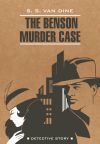





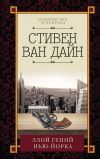
![Книга Злой гений Нью-Йорка [Дело Епископа] автора Стивен Ван Дайн](/books_files/covers/thumbs_100/zloy-geniy-nyu-yorka-delo-episkopa-13635.jpg)
